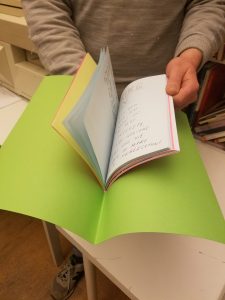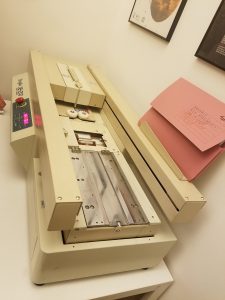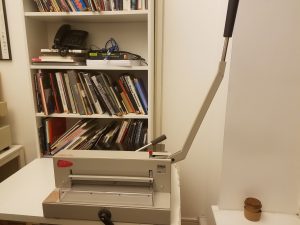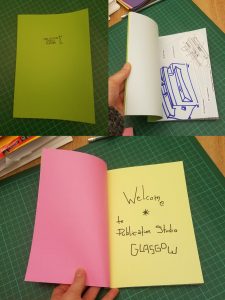 As part of Book Week Scotland, Publication Studio opened a new office in Glasgow at the Centre for Contemporary Arts (CCA). Just a little background on Publication Studio: Founded in 2009 in Portland, Oregon in the United States, it prints and binds books individually and on-demand. Publication’s Studio’s goal is to provide the means for writers to produce their creations. Since its inception, Publication Studio has expanded internationally. In conjunction with Good Press, a bookshop and art gallery in Glasgow, and the CCA, Publication Studio opened its newest addition in Glasgow this week. Now, this particular office is more like a room within the CCA’s office space and is run by four people, who own other book-related businesses in Glasgow; they are not at CCA on a day-to-day basis.
As part of Book Week Scotland, Publication Studio opened a new office in Glasgow at the Centre for Contemporary Arts (CCA). Just a little background on Publication Studio: Founded in 2009 in Portland, Oregon in the United States, it prints and binds books individually and on-demand. Publication’s Studio’s goal is to provide the means for writers to produce their creations. Since its inception, Publication Studio has expanded internationally. In conjunction with Good Press, a bookshop and art gallery in Glasgow, and the CCA, Publication Studio opened its newest addition in Glasgow this week. Now, this particular office is more like a room within the CCA’s office space and is run by four people, who own other book-related businesses in Glasgow; they are not at CCA on a day-to-day basis.
Everyone who uses Publication Studio’s facilities has to go through an induction, so they can safely use the machinery. Both Isabella Pioli and I decided to attend the book binding workshop to see what they could teach us about this aspect of the production process. As we walked into the small, back-room office that contains the binding machine—henceforth called the binder—and the guillotine (the paper cutter), you could smell the glue—a very similar smell to the one our class experienced on our trip to Bell & Bain.
about this aspect of the production process. As we walked into the small, back-room office that contains the binding machine—henceforth called the binder—and the guillotine (the paper cutter), you could smell the glue—a very similar smell to the one our class experienced on our trip to Bell & Bain.
As indicated by the glue, Publication Studio focuses on perfect binding. For those who don’t know what that means, perfect binding is usually used on paperback or soft cover books; it glues the separate sections of the book and the cover (usually a slightly thicker material) together at the spine. Much to our surprise, it was a very simplified printing and binding process. It’s literally the DIY level of production. Their printing is inexpensive and not as high-quality as a professional printer. As our inductors put it: “It’s a high-quality photocopier.” You would come for your scheduled time with a prepared PDF and your own paper to print what you plan to bind. They are able to print in black and white or colour at extremely discoun ted prices and on all types of paper, within reason. (You can’t print on sand-paper or tin foil, for those artists out there.)
ted prices and on all types of paper, within reason. (You can’t print on sand-paper or tin foil, for those artists out there.)
Interestingly, unlike a printing and binding company like Bell & Bain, you bind (glue together) the pieces of paper you’ve printed rather than the folded together sections of a traditional book printer. At least, the sample product we produced today was individual pieces. Depending on the creator, the size of the paper, and how he/she printed the product, that has the potential to change. The binder itself, though smells and looks intimidating, was actually pretty easy to use. Surprisingly, the guillotine turned out to be the most difficult, simply because you had to get your paper measurements exactly right so a s not to cut off more than you mean to. (I learned this the hard way!)
s not to cut off more than you mean to. (I learned this the hard way!)
Overall, our book binding induction was interesting and very hands-on. Although it’s not practical for printing and binding lots of books, Publication Studio is a good place to produce individual works. No one besides the author/creator has ownership over anything produced through Publication Studio. This company just provides the facilities and the means for people to produce their own content for a much lower rate than if it was self-produced elsewhere. For self-publishers who are looking to have a few hard copies of their books or for writers looking to send finished products to traditional publishers, Publication Studio offers them a space to let their creations come to life.
by Jo Ripoll

